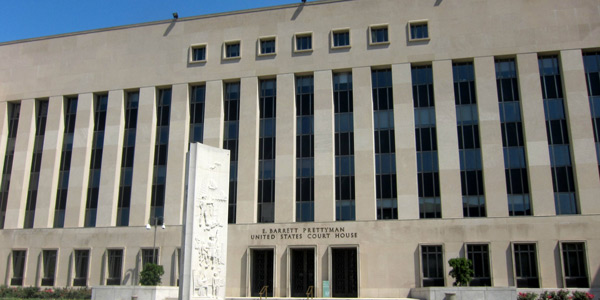By Michael Kuser
The D.C. Circuit Court of Appeals last week rejected challenges to FERC Order 1000 by New England Transmission Owners and state officials (15-1139).
The TOs had challenged FERC’s March 2015 ruling on ISO-NE’s Order 1000 compliance filing, in which the commission ordered the removal of the right of first refusal in the Transmission Operating Agreement among ISO-NE and the TOs (ER13-193, ER13-196). Emera Maine acted as lead petitioner, with independent transmission developer LS Power Transmission opposing the TOs as lead intervenor.
The second part of the ruling rejected a petition by the state officials complaining that FERC’s ISO-NE compliance order violated state sovereignty.
TOs’ Challenge
The TOs asserted that FERC’s orders were inconsistent with its past decisions, that the commission applied the wrong legal standard for measuring whether the Mobile-Sierra presumption had been overcome, and that the commission ignored the evidence before it.
The April 18 ruling by a three-judge panel, authored by Judge Robert L. Wilkins, disagreed with the TOs on both counts.
The court rejected what it termed the TOs’ “invitation to don blinders” in making a narrow interpretation of Mobile-Sierra, which requires the commission to “presume a contract rate for wholesale energy is just and reasonable,” prohibiting it from rejecting the contract unless it finds that the rate “seriously harm[s] the public interest.”
It also dismissed the TOs’ contentions that the commission identified no evidence to support its conclusion that the ROFR harmed the public interest by inhibiting transmission development and that it ignored the contrary evidence submitted by ROFR defenders.
The TOs introduced evidence that ISO-NE had placed $4.7 billion in new transmission facilities in service and had another $5.7 billion in projects in development. That, the TOs said, proved that the ROFR did not harm the public interest.
The court said the TOs based their argument “on the faulty premise that economic theory cannot provide the basis for FERC’s decisions.”
The commission confronted the evidence of transmission development “head-on,” the court said. The commission said the ROFR “continues to threaten the public interest by avoiding expected efficiencies and cost savings and makes the need to foster competitive practices more acute.”
The court said the commission explicitly rejected the inference that “the incumbent transmission owners are sufficiently developing projects under the existing framework with their current rights of first refusal.” While the TOs’ claim of a functioning market with the ROFR “may be plausible,” the contrary conclusion drawn by the commission is also plausible, the judges said.
“Where the evidence might support more than one rational interpretation, ‘the question we must answer … is not whether record evidence supports [the petitioner’s] version of events, but whether it supports FERC’s,’” the court ruled.
NESCOE Ruling
The second part of the ruling rejected a petition by the New England States Committee on Electricity and agencies from five of the six states it represents: Connecticut, Massachusetts, New Hampshire, Rhode Island and Vermont. The state petitioners claimed that in its ISO-NE compliance order, the commission went beyond Order 1000 and “impermissibly altered the balance of responsibility and power as between state governments and ISO-NE.”
The five states insisted that Order 1000 requires not only a process to identify transmission needs driven by public policy requirements and evaluate potential transmission solutions that could meet those needs, but also selection of whichever project is the most efficient or cost-effective. They also contended that the Federal Power Act does not grant FERC authority over “the means by which states meet their own public policy mandates.”
The court rejected the argument as an objection to Order 1000’s entire regional planning and cost allocation scheme, which assigns ISO-NE the role of planning for the region’s transmission needs.
“Order No. 1000 established a regional planning process that is agnostic as to the provenance of the transmission needs, whether resulting from population growth or federal public policy or state public policy,” the ruling said. “The division of roles between ISO-NE and the states poses no jurisdictional problem for FERC. ISO-NE has no role in setting public policy for the states. ISO-NE considers transmission needs that arise from a variety of sources, one of which is the public policy requirements chosen by federal and state officials.”
The court said the states misread the word “select” in Order 1000.
The commission said Order 1000 and subsequent rehearing orders were intended to clarify which entity must control each step of the process and that there is no requirement that ISO-NE “must select … a transmission solution to address every identified transmission need driven by a public policy requirement.”
If a solution is selected, however, FERC said it “must be selected by ISO-NE rather than by NESCOE.”
“In light of these clarifications by the commission,” the court concluded, “there is no inconsistency with Order No. 1000.”
‘Off Ramp’
NESCOE General Counsel Jason Marshall found some solace in the adverse ruling. “While the court denied our petition, its ruling provides an interpretation that we have long sought: that ISO New England is not required to select a policy-driven project as part of the Order 1000 process,” he said in a statement. “This is an important potential ‘off ramp’ and clarification, which helps to prevent costly projects from being selected for development that states do not view as advancing their policies or that are not in the interest of consumers.
“We are still reviewing the court’s ruling and have not made a determination at this point regarding further review,” he added.




